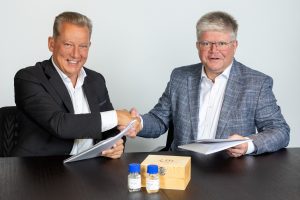Gunther Sproesser, materials expert at TÜV Rheinland, said: “Our new ‘H2.23’ standard combines the latest technology with global expertise to test materials for hydrogen compatibility.” The challenge is that hydrogen can penetrate materials, making them brittle and causing damage to the point of component failure. Upon successful certification, manufacturers can receive the ‘H2-Ready’ test mark, demonstrating to customers that their materials can safely handle compressed hydrogen. The H2-Ready test mark is only awarded to materials that meet strict criteria and requires regular monitoring of production.
“In Germany, there is a lack of recognized regulations for the long-term and safe use of components with pressurized hydrogen. We are filling this gap with the ‘H2-Ready’ certification. In doing so, we are ensuring greater safety and confidence in the rapidly growing hydrogen industry,” added Sproesser.
TÜV Rheinland has already certified several materials from Busch + Kunz, a European manufacturer of weld fittings, in accordance with the H2-Ready standard.






